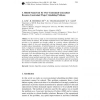Free Online Productivity Tools
i2Speak
i2Symbol
i2OCR
iTex2Img
iWeb2Print
iWeb2Shot
i2Type
iPdf2Split
iPdf2Merge
i2Bopomofo
i2Arabic
i2Style
i2Image
i2PDF
iLatex2Rtf
Sci2ools
102
click to vote
AIR
2004
2004
A Hybrid Framework for Over-Constrained Generalized
Abstract. In this work we study an over-constrained scheduling problem where constraints cannot be relaxed. This problem originates from a local defense agency where activities to be scheduled are strongly ranked in a priority scheme determined by planners ahead of time and operational real-time demands require solutions to be available almost immediately. A hybrid framework is used which is composed of two levels. A high-level component explores different orderings of activities by priorities using Tabu Search or Genetic Algorithm heuristics, while in a low-level component, constraint programming and minimal critical sets are used to resolve conflicts. Realdata used to test the algorithm show that a larger number of high priority activities are scheduled when compared to a CP-based system used currently. Further tests were performed using randomly generated data and results compared with CPLEX. The approach provided in this paper offers a framework for problems where all constraints a...
AIR 2004 | Genetic Algorithm Heuristics | Local Defense Agency | Over-constrained Scheduling Problem |
Related Content
| Added | 16 Dec 2010 |
| Updated | 16 Dec 2010 |
| Type | Journal |
| Year | 2004 |
| Where | AIR |
| Authors | Andrew Lim, Brian Rodrigues, Ramesh Thangarajo, Fei Xiao |
Comments (0)

